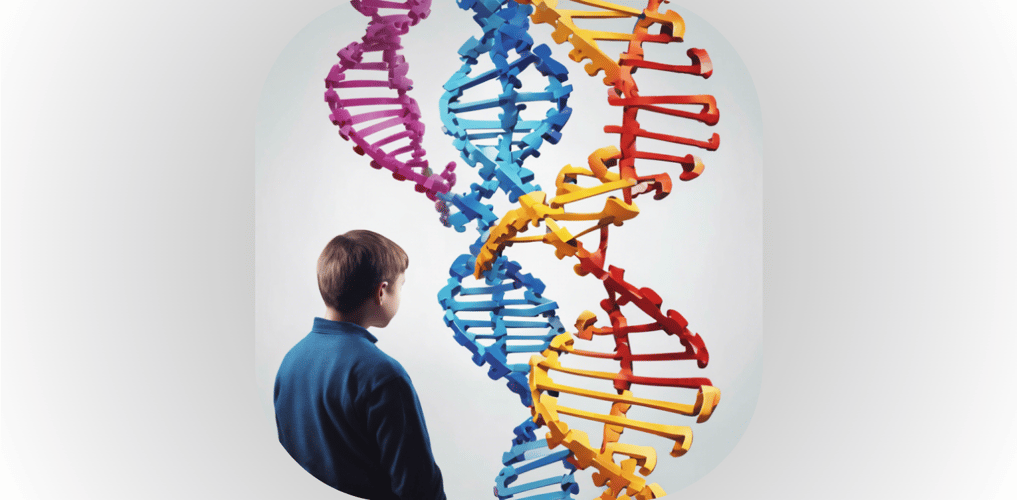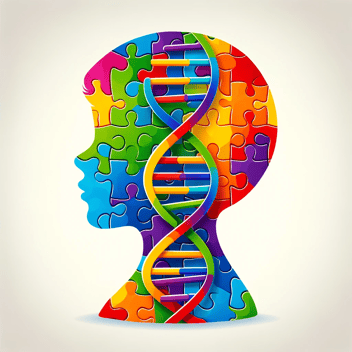Unraveling the Genetic Mystery of Autism
- Home
- Blog

Delve into the complex relationship between genetics and autism, exploring the latest research and discoveries.
The Link Between Genetics and Autism
Autism is a complex neurodevelopmental disorder that is believed to have a strong genetic component. Research has shown that genetics play a significant role in the development of autism, and although the exact genes involved and the specific mechanisms are still being unraveled, there is much that we know today that can guide evaluation and treatment.
When providing guidance to parents who have a child diagnosed with autism we frequently recommend the benefits of genetic testing to provide a precision psychiatry approach.
Numerous studies have demonstrated that individuals with autism are more likely to have relatives who are also on the autism spectrum. Twin studies have shown that identical twins, who share 100% of their genes, are more likely to both have autism compared to fraternal twins, who share only about 50% of their genes. These findings suggest a strong genetic influence on the development of autism.
In recent years, scientists have made significant progress in identifying specific genes that may be associated with autism. Through genome-wide association studies and other genetic analyses, researchers have identified several gene variants that are more common in individuals with autism. However, it's important to note that these gene variants are not the sole cause of autism and that other factors, both genetic and environmental, also contribute to its development.
Understanding Genetic Risk Factors
There is no one autism gene. Instead there are many environmental, nutritional, and inflammatory factors that interact with an individual’s genomics that contribute to autism. These genetic and interacting factors are still being explored. Hundreds of genetic variations that appear to increase the likelihood of developing Autism have been identified. These variations involve different genes and affect various biological processes in the brain.
One of the genetic risk factors associated with autism is the presence of rare de novo mutations. De novo mutations are genetic changes that occur spontaneously and are not inherited from the parents. These mutations can disrupt normal brain development and contribute to the development of autism. These de novo variations tend to be quite rare (generally found in less than 1/5000 individuals) but when found they are highly significant.
In addition to de novo mutations, researchers have also found that there are a lot of common (found in 1-30% of the population) inherited genetic variations that are not disease-causing for autism but are disease-contributing. These variants can involve genes related to inflammation, mitochondrial function, synaptic function, neuronal connectivity, and immune system regulation, among others. As research progresses it is becoming clear that addressing these often modifiable, contributing variants, both in individuals with and without the rarer de novo variants can significantly improve a child’s functioning and outcomes.
Autism is a complex disorder influenced by a combination of genetic, environmental, and other factors. The value of genetic testing in autism, when combined with the FRAT test (folate receptor antibody test), gut microbiome assays, and nutritional and cellular health markers, is that these tests provide a better understanding of the modifiable root cause drivers of autism, and how to treat them.
Exploring the Role of Heredity
The role of heredity in autism is well-established, as numerous studies have shown a strong familial clustering of the disorder. Families with one child on the autism spectrum are more likely to have another child with autism compared to families without any affected children.
Heritability estimates suggest that genetics account for a significant proportion of the risk for developing autism. However, it's important to note that heredity is not the sole determinant of autism. Environmental factors, such as prenatal exposures and early life experiences, also play a role in its development.
Genetic studies have also revealed that autism is a highly heterogeneous disorder, meaning that it can be caused by different combinations of genetic variations. This genetic heterogeneity contributes to the wide range of symptoms and severity observed in individuals with autism.
Understanding the role of heredity in autism is crucial for identifying individuals at risk and developing effective interventions. Many of the genetic variations associated with autism can be treated with combinations of supplements, nutrients, and lifestyle interventions, and there is a growing body of scientific literature support in these types of interventions.
Genetic Testing and Diagnosis
Genetic testing can play a role in the diagnosis and management of autism. While there is currently no genetic test available to definitively diagnose autism, as this is a clinical diagnosis, genetic tests such as IntellxxDNA's Neurodevelopmental Panel can help identify certain genetic variations that are associated with an increased risk of developing the disorder, and how to modify the expression of these genes ("turn them on or turn them off") to promote higher levels of socialization and communication, improve learning, and reduce problematic behaviors in children with ASD.
IntellxxDNA genetic testing can provide valuable information for families, helping them understand the underlying genetic factors contributing to their child's autism. It can also guide treatment decisions and help identify potential co-occurring conditions that may require additional support.
Genetic Testing Guides Treatment - The Story of Tom
Tom was a 13-year-old adolescent with a long history of treatment interventions that were largely unsuccessful. In the realm of personalized medicine for Autism Spectrum Disorder (ASD) based upon a Root Cause Analysis approach, for patients like Tom genomics is leading the way toward targeted interventions that are beginning to change lives. Central to this discussion are the revelations around specific gene variants, like SHANK3, and their modulation through innovative therapies. This focused exploration delves into how understanding and addressing these genetic intricacies have paved the way for significant clinical improvements in patients with ASD, like Tom.
SHANK3 Gene Variant and Its Modulation:
SHANK3 stands out in the genomic landscape of ASD for its critical role in neural connectivity and function. Variants in SHANK3 have been robustly associated with increased ASD risk, underpinning socio-communicative impairments in children, through its effects in altering methylation patterns. Decreased SHANK3 protein levels disrupt synaptic organization in the brain contributing to ASD symptoms. Synapses are what connect together the 100 billion neurons in each of our brains and enable circuits in the brain to work effectively to communicate information.
A Root Cause Psychiatry Approach
The IntellxxDNA™ neurodevelopmental report was ordered for Tom. In addition, blood labs, urine organic acids testing (OAT), stool studies, nutritional evaluation, and food sensitivity tests were also obtained. An action plan was formed in the following weeks to address the factors highlighted by these preliminary tests discussed above while the genomic results were pending.
Tom was shown to have a high IgG response to dairy, gluten, and egg, and, thus, it was suggested that those foods be eliminated from his diet. Several nutritional deficiencies were identified and addressed, including him potentially being low on fiber, iron, vitamin B6, vitamin B12, methylfolate, and vitamin D. N-acetylcysteine was also added, due to test results suggesting low glutathione levels. Gut testing revealed that he had markers of poor absorption and high lactoferrin levels, which can indicate intestinal inflammation. In addition, this child was shown to have hyperlipidemia.
To address these areas, in addition to the elimination of dairy, gluten, and eggs, micronutrients were repleted through supplementation and diet. Omega-3s were prescribed to address the cholesterol imbalances and for the general anti-inflammatory benefits. A mild improvement in symptoms was observed with these changes.
Addressing the SHANK3 deficiency became a focal point of treatment. Interventions aimed to increase SHANK3 protein concentration and, by extension, improve synaptic function and neural connectivity. Strategies included the use of zinc supplementation, given at a moderate to high dose (45 mg twice daily), as zinc is known to upregulate ("turn on") SHANK3 expression. This approach, rooted in the pediatric literature for its safety and efficacy, exemplifies the direct application of molecular insights into treatment planning.
Clinical Outcomes:
The results of these genomically targeted interventions were profoundly positive. One of the most striking outcomes was observed in a patient who, within weeks of starting the personalized treatment plan, exhibited remarkable improvements. For the first time, the child was able to attend and enjoy school, showcasing an unprecedented calmness. The parents reported this progress as the most significant improvement seen throughout years of treatment, attributing the success to the genomically targeted approach. The modulation of SHANK3, alongside addressing other identified genomic variants, played a crucial role in these outcomes, underscoring the power of precision medicine in ASD.
Conclusion:
The integration of genomic insights into the holistic treatment of ASD offers a new horizon for personalized medicine. By focusing on specific gene variants like SHANK3 and tailoring interventions to address these genetic factors, clinicians have begun to witness significant improvements in patients' lives. This approach not only highlights the importance of understanding the genetic underpinnings of ASD but also illustrates the potential for genomic medicine to guide more effective and personalized treatments. The journey of integrating genomics into clinical practice for ASD is just beginning, and the stories of improved patient outcomes fuel the optimism for what precision medicine can achieve in the near future.
Future Implications and Research Directions
The study of genetics in autism is a rapidly evolving field, and ongoing research is uncovering new insights into the genetic basis of the disorder. As our understanding of the genetic underpinnings of autism improves, it holds the potential for developing more targeted and personalized interventions.
Future research directions in the field of autism genetics include exploring rare genetic variants, investigating gene-environment interactions, and studying epigenetic modifications. Advances in technologies and analytical approaches are enabling researchers to uncover the complex genetic architecture of autism and identify novel risk factors.
In addition to genetic research, it is also important to continue studying the role of environmental factors in autism. This is the study of epigenetic influences. Understanding how genetic and environmental factors interact can provide a more comprehensive understanding of the disorder and inform strategies for prevention and intervention.
By unraveling the genetic mystery of autism, and combining this with Root Cause Psychiatry, we can pave the way for improved diagnostics, better treatment options, and ultimately, a greater understanding of this complex disorder.
We invite you to book a no-cost consultation with one of our autism experts
Intrigued by the possibility of a different approach to autism based upon genetic testing? Let us discover together how a personalized, integrative approach to autism can offer not just hope, but real, sustainable healing.
.png?width=144&height=144&name=Untitled%20design%20(34).png)



